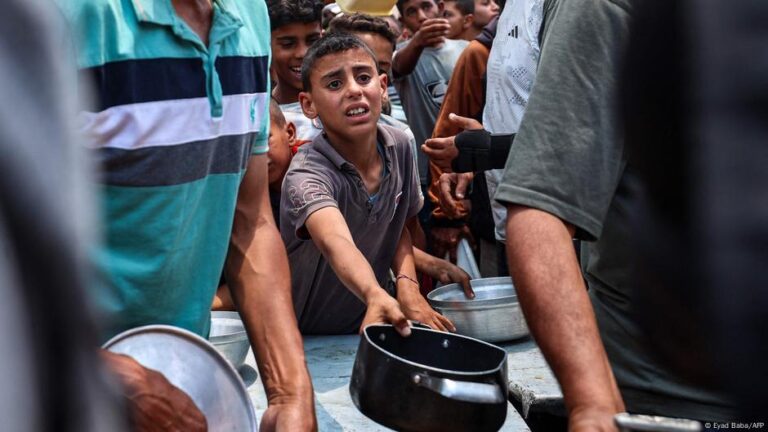The Palestinian Red Crescent on Thursday warned that aid trucks allowed into Gaza this week have not yet reached civilians and that the limited number of deliveries risks fueling chaos and violence.
Israel announced this week it would begin allowing aid into the Palestinian territory after a nearly three-month blockade of food and supplies. However, the UN has expressed frustration with the scale and pace of deliveries as most trucks stuck are at the border crossing or awaiting Israeli permission to distribute supplies.
UN agencies and aid groups have been struggling to retrieve and distribute the aid, blaming complicated Israeli military procedures and the breakdown of law and order inside the territory.
UN spokesperson Stephane Dujarric said about 90 trucks of aid were transported to multiple destinations within Gaza on Wednesday, and the World Food Program reported that a “handful of bakeries” in southern and central Gaza had resumed bread production.
A few of the UN trucks that did enter Gaza were “intercepted” by desperate residents, Dujarric added later in the day.
“We understand that a small number of trucks carrying flour were intercepted by residents and their contents removed,” he said. “As far as I know, this was not a criminal act with armed men.”
What is happening with Gaza aid deliveries?
“I can prove that nobody has received [aid]. No civilian has received anything yet,” Younis Al-Khatib, President of the Palestine Red Crescent Society, said early on Thursday afternoon. “In fact, most of these trucks are still in Karem Shalom at the border, inspected, but not into Gaza.”
Al-Khatib described the modest aid shipments as an “invitation for killing,” citing fears of mobbing, looting, and unrest as desperate residents await food and medical supplies.
The warning follows reports that about 90 trucks’ worth of humanitarian aid have been collected by agencies out of nearly 200 that entered Gaza in recent days, but distribution remains stalled due to insecurity and logistical hurdles.
Meanwhile, Palestinian health authorities say starvation-related deaths have begun to rise, with at least 29 children and elderly individuals reported dead in recent days. Aid officials continue to stress that current deliveries are far below what is needed to prevent further humanitarian catastrophe.
Hopes of limited aid on the way
Palestinian officials said flour and other food aid would start to reach some of Gaza’s most vulnerable people on Thursday, but they added this would be nowhere near enough to compensate for shortages caused by an 11-week blockade.
“Some bakeries will begin receiving flour to produce bread, and we expect the distribution of bread to begin later today,” Amjad al-Shawa, director of the Palestinian Non-Governmental Organizations Network in Gaza, told the Reuters news agency on Thursday.
The Israeli newspaper Haaretz reported on Thursday, citing the International Committee of the Red Cross, that Gazans began receiving items such as flour and baby food and that a field hospital has received medical equipment.
“In close touch with team in Gaza. Today will be crucial. Truckloads of lifesaving aid finally on move again,” UN aid chief Tom Fletcher posted on X.
“I’m in awe of [the] courage of our humanitarians,” he added. “They continue to face huge challenges getting goods out of the crossing to where it is needed. Vital, lifesaving work.”
Israel’s three-stage aid plan faces criticism
Facing global pressure to ease the blockade and end fighting in Gaza, Israeli Prime Minister Benjamin Netanyahu has said he is open to a “temporary ceasefire” but emphasized that the military aims to bring all of Gaza under Israeli control.
Israel has said the blockade was necessary because the Islamist militant group Hamas diverts humanitarian aid. Israeli officials have also said they plan to implement a new aid distribution system within days.
Initially, Israel says it will permit basic food supplies into the coastal enclave to avert a humanitarian crisis. The second phase would involve opening food distribution points by US companies.
In the final step, a “sterile zone” free from Hamas in the south of Gaza would be created to facilitate humanitarian assistance for displaced Palestinians.
In an address on Thursday, Netanyahu said construction of the first humanitarian aid distribution zones in Gaza would be complete in the coming days.
UN agencies and aid groups have been warning that the proposed system would not meet growing humanitarian needs and could force large numbers of people to relocate to reach aid sites.
They said the plan violates humanitarian principles by requiring people to move to access aid, rather than delivering assistance based on need where they currently live.
Edited by: Sean Sinico


